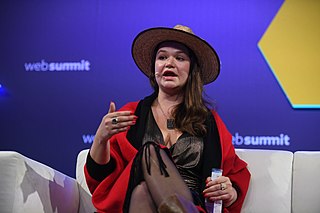A Quote by James Surowiecki
I think people don't understand compound interest because typically no one ever explains it to them and the level of financial literacy in the US is very low.
Related Quotes
In terms of my profession, I'm passionate about financial literacy. I want to live in a financially literate society. I want kids to understand the importance of savings and investing. I want to try to replicate the great savers who came out of the Depression, the best savers the country has ever seen. It's crucial that people understand the importance of financial literacy, because it's actually life saving.
Financial literacy is not an end in itself, but a step-by-step process. It begins in childhood and continues throughout a person's life all the way to retirement. Instilling the financial-literacy message in children is especially important, because they will carry it for the rest of their lives. The results of the survey are very encouraging, and we want to do our part to make sure all children develop and strengthen their financial-literacy skills.
We've reached a very low-level equilibrium where it's not clear whose interest it is in to develop Africa... It's not in the interest of those in the aid industry to develop Africa because then there'd be no more industry and 500,000 people would lose their jobs. The only people whose interest it is in is Africans, but they have no voice.
We don't invest in financial literacy in a meaningful way. We should be teaching elementary school children how to balance a checkbook, how to do basic accounting, why it's important to pay your bills on time. First, education. Begin the learning process as early as possible, in elementary school. Second, encourage and support entrepreneurism. Third, policy. I know it's a priority of the US Treasury to augment financial inclusion and increase financial literacy.
There are many agreements across the so-called "world religions," at a certain level of abstraction. But when it comes to applying them in concrete situations they may lead to incompatible decisions. As an example, some people think that Christian ideas of sexual modesty suggest that homosexuals should be locked up, some people think that they mean that the churches should recongize gay marriages. But everyone believes in sexual modesty. I think there are universal moral truths, whether or not everyone accepts them. Here's one very low level but important one: it's very bad to torture people.
From the 1990s onward, the financial sector created a vast array of instruments designed to separate investors from their money, financial derivatives of an ever-increasing level of complexity. At some point, this complexity reached a point where even the creators of the derivatives themselves didn't understand them.
It's [Into the Badlands] something that's very, very different and I think that's why it divided critics initially because they didn't understand it or get it. They didn't understand or have a knowledge of what we were trying to do. Bringing in the Asian martial arts aesthetic to American television. For us, these are the people who will make the show a hit or a failure in future seasons. So it's for us to respect them and interact and see what they have to say.
































